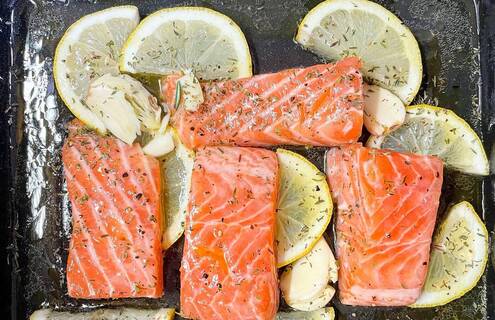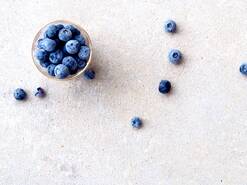
You are what you eat isn’t just a saying. Your diet impacts your health and well-being — and there are studies to prove it.
Shawn Richardson, Director of Nutrition Services and Environmental Services at Alice Peck Day Memorial Hospital, recently took a course on nutrition and the aging brain. He already uses the Mediterranean Diet — a way of eating based on the traditional cuisines of countries bordering the Mediterranean Sea — as the basis of the hospital’s meals for patients, staff and visitors.
Related article: APD's Growing Season
“It’s a plant-based diet incorporating whole grains, vegetables, legumes, fruits, nuts, seeds,” Richardson said. “It has been shown to reduce the risk of heart disease, diabetes, and promote brain health.”
What you eat can help prevent dementia or control dementia. The Dementia Society of America also recommends the Mediterranean Diet and suggests “lowering consumption of sugary foods and drinks, processed foods, and carbohydrates” which can increase inflammation of brain cells.
Richardson provides an example. “Maybe your snack choice is a granola bar. The oats are good, the almonds are good, but once it is processed a lot of the nutrients are removed,” he said. “It’s better to eat whole foods, such as a handful of almonds.”
In addition to opting for whole foods, you should add Omega-3 (good for cell or muscle growth) rich or antioxidant (help protect your cells) rich foods to your diet, such as:
- Salmon or mackerel (oily fish)
- Walnuts, pistachios or macadamia nuts
- Chia seeds and/or flaxseed
- Whole fruits and vegetables
- Berries: blackberries, blueberries, and raspberries
- Fiber from foods like oats, beans, and barley
- Fermented foods, like yogurt
Processed foods — foods with added fats and oils, sugars, or refined grains — should be avoided. Also consider limiting or discontinuing these foods:
- Omega-6 foods, such as vegetable oil blends. “You do need some Omega-6 fatty acid in your diet, but too much can cause inflammation,” Richardson said. “One easy switch is to cook with olive oil, which has a higher smoke point than extra virgin olive oil, instead of vegetable oil. Avocado oil is a healthy choice, too.”
- Fructose, with one of the main offenders being high fructose corn syrup
- Sweeteners, such as agave or honey
- Dried fruit. “Choose fresh berries and citrus over dried fruits and juices,” Richardson said. “Unless you are drying the fruit yourself, there is usually some unhealthy addition to any processed food.”
It’s never too early to make a change. And, Richardson said, you don’t have to overhaul your entire diet — you can do four simple things to start:
ONE: Have a blueberry yogurt smoothie every day. Throw in some chia seeds or flaxseed for bonus Omega-3.
TWO: Eat a handful (14 halves) of walnuts as a snack.
THREE: Eat salmon twice a week.
FOUR: Cook (and bake) with olive oil.
Does this mean your favorite dark chocolate or potato chips will have to go? As long as they don’t form the basis of your diet — and healthy brain foods do — you can still have your occasional snacks.
“It’s about balance,” Richardson said. “It’s important not to think of treats as cheats. It’s okay to treat yourself. Moderation is key.”
